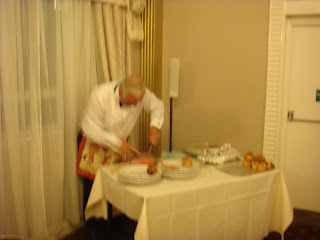I’m discovering that many Rotary Club Charters have their own characteristics and traditions. Once such tradition occurs at the Southwell Club Charter which is held in the historic Saracen’s Head Public House, Southwell. This is famed for being the place where King Charles I spent his last night as a free man in May 1646, before surrounding the next day during the English Civil War.
 |
| The Execution Warrant for King Charles I |
 Roast
Beef always features on the Southwell menu I was told. The Beef is also brought out and carved in
front of the Charter attendees. I
happened to have been seated next to David Steel, a retired Butcher and Past
President of Southwell, who also did the honours of carving the meat. I did ask that he give me a generous portion!
Roast
Beef always features on the Southwell menu I was told. The Beef is also brought out and carved in
front of the Charter attendees. I
happened to have been seated next to David Steel, a retired Butcher and Past
President of Southwell, who also did the honours of carving the meat. I did ask that he give me a generous portion!
The
sweet was Bramley Apple Crumble. The
Bramley Cooking Apple is almost exclusively a British variety, but the most
important cooking apple in the UK. The
first ‘Bramley’s Seedling’ tree was grown in Southwell after a young girl
called Mary Ann Brailsford planted apple pips in 1809. The cottage in whose grounds the tree grew
was sold to the local butcher, Matthew Bramley in 1846. Henry Merryweather asked Bramley if he could
take cuttings from the tree and start to sell the apples in 1856. Matthew Bramley was in agreement but only if
the apples bore his name. The first
Bramley Apple Tree still stands in Southwell today and is considered a treasure
of the town.

The
speaker was Peter Cook, Headmaster of the Wellow School and former Rugby Union
star. Peter spoke about the impact of
fate and luck in both his sporting and academic careers, and his message was
one of encouraging everyone (including his students) to strive to achieve the
best they could.

No comments:
Post a Comment